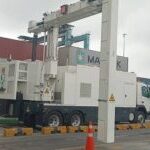 The Federal Government through the Ministry of Finance and the Nigeria Customs Service (NCS) has commissioned three mobile cargo scanners to checkmate the importation of arms and ammunition and other prohibited items into the country through the seaports.
The Federal Government through the Ministry of Finance and the Nigeria Customs Service (NCS) has commissioned three mobile cargo scanners to checkmate the importation of arms and ammunition and other prohibited items into the country through the seaports.
The commissioning covers those earlier installed at the Apapa and Tin Can Island ports in Lagos and Onne Port in Rivers State. Each of the scanners has the capacity to process and scan over 500 containers daily.
It would be recalled that In July 2020, the Federal Executive Council (FEC) approved $18.12 million for the purchase of the cargo scanners which were delivered in December last year to ease port operations and eliminate 100 per cent examination, which used to encourage corruption among stakeholders and examination officers at the ports.
The contract was actually awarded to Messrs Airwave Limited inclusive of foreign and local components of N3.255 billion and a five per cent Value Added Tax (VAT).
Speaking at the commissioning of the new Nuctech Mobile Scanners for the Customs, Minister of Finance, Budget and National Planning, Mrs. Zainab Ahmed, commended the FEC for granting approval for the procurement and installation of the scanners, as well as the training of over 120 officers of the NCS.
She said the project would no doubt aid the NCS in delivering its mandate in line with key priorities of the President Muhammadu Buhari-led administration.
According to her, the scanners have the capacity to detect prohibited imports concealed in cargo and they would enable more cargoes to be scanned and also bring about the desired efficiency and effectiveness in cargo examination processes.
“The commissioning of the three non-intrusive scanners is in line with efforts to expedite Customs operations and achieve its mandate of ease of doing business, trade facilitation and preventing congestion at the ports.
“The three scanners will help increase revenue for the government and improve national security. They will also help to enhance the remote audit trailing of goods within the port system,” she said.
She urged the Nigerian Ports Authority (NPA), port terminal operators and all stakeholders in the port system to cooperate with the NCS to take full advantage of the scanners.
“The commissioning of the three new scanners is a milestone in the NCS’ efforts to expedite Customs operations, achieve ease of doing business, facilitate trade, prevent port congestion, increase revenue generation for the government and improve national security.
“I, therefore, implore the management of the NCS to collaborate with the contractor of the scanners to ensure proper maintenance and their full utilisation within the 30 months provided in the contract agreement, as well as enhanced capacity building and training of 120 NCS scanning officers,” she added.
The minister said that efforts were being made to procure more scanners for the seaports, land borders and airports across the country, saying the essence was to improve efficiency and generate more revenue for the government.
Also speaking at the event, the Comptroller General of the Nigeria Customs Service (NCS), Col. Hameed Ali (rtd.), said the commissioned scanners were an intervention pending the commencement of the Customs modernisation project that would deploy no fewer than 135 scanners, adding that by 2023, there would be scanners all over the country.
Ali stated that as part of the government’s reform strategy, the NCS was compelled to adopt technology as the linchpin for trade facilitation, adding that by recognising its strategic importance, the Service has chosen to embrace the project in its entirety.
“Our modernisation project seeks to automate all our processes and procedures of which the inspection of imports and exports is fundamental. We know that to remain competitive, our ports have to be more efficient and effective, as trade volumes increase, so must our capacity for facilitation, efficient cargo management and full automation of Customs and other regulatory processes be guaranteed.
“We expect that this will reduce the cost of clearing and ultimately the price of goods in the open market, an occurrence that will be beneficial to all consumers in Nigeria,” he stated.
 The New Experience Newspapers Online News Indepth, Analysis and More
The New Experience Newspapers Online News Indepth, Analysis and More
